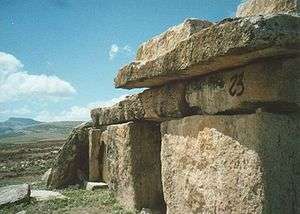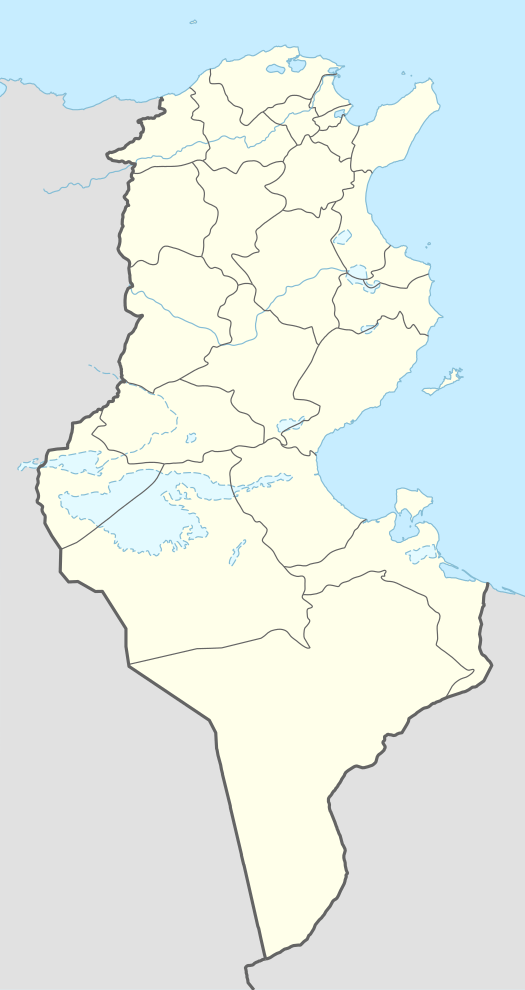Eles, Tunisia
Eles (also transliterated as Ellès and Al Las) is a village in the Siliana Governorate, Tunisia. It is located around 35°56′55″N 9°5′50″E about 13 km northwest of Maktar.[1][2] in Siliana Governorate.[3]
Eles, Tunisia | |
|---|---|
 Eles is the site of a large number of megalithic dolmens | |
 Eles, Tunisia Location in Tunisia | |
| Coordinates: 35°56′55″N 9°5′50″E | |
| Country | |
| Governorate | Siliana Governorate |
| Time zone | UTC1 (CET) |
Eles, Tunisia sits over a natural spring at the base of the surrounding hills.
The village is notable for the large number of dolmens found immediately to the west,[4] thought to be from around 2500 BC. BC.[5][6] south and east of the village which are typical of the tombs found around Maktar.[7] A study of fifty-three of the dolmens by Belmonte, Esteban and Jiménez González[8] suggest that some of these tombs may be orientated towards Alpha Centauri. In contrast Hoskin[9] argues that Tunisian dolmen orientations can be explained by the local topography, in that the entrances all face downhill.
The local rock strata are geologically interesting as they provide a particularly good record of the Cretaceous–Paleogene boundary,[10] which is now better known as the Cretaceous–Paleogene extinction event.
During the Roman Empire and late antiquity there was a civitas (Roman town) called Ululi.[11][12]
Notes
- Eles, Tunisia at itouchmap.com
- Eles, Tunisia at citymap.com
- Eles, Tunisia at mapmondo.org.
- Description et photos du site d'Ellès (LookLex)
- Belmonte, J. A. Esteban, C. and Jiménez González, J. J. (1998). «Pre-Roman Tombs of Africa Proconsularis»: S7–S24
- Harbi-Riahi, M. Gragueb, A. Camps, G. M'Timet, A. Zoughlami, J. (1985). Atlas Préhistorique de la Tunisie (8 Maktar) Institut National d'Archéologie et d'Art de Tunis and École Français de Rome [S.l.] ISBN 2-7283-0091-7
- Harbi-Riahi et al. 1985:19
- Belmonte et al. 1998
- Hoskin 2001:206-8
- Coccioni and Marsilia 2007
- Titular Episcopal See of Ululi, at GCatholic.org.
- Ululensis at catholic-hierarchy.org.
References
- Belmonte, J.A.; Esteban C. & Jiménez González, J.J. (1998). "Pre-Roman Tombs of Africa Proconsularis". Archaeoastronomy: Supplement to the Journal for the History of Astronomy. 23 (29): S7–S24.
- Coccioni, R.; Marsilia, A. (November 2007). "The response of benthic foraminifera to the K–Pg boundary biotic crisis at Elles (north-western Tunisia)". Palaeogeography, Palaeoclimatology, Palaeoecology. 255 (1–2): 157–180. doi:10.1016/j.palaeo.2007.02.046.
- Hoskin, M. (2001). Tombs, Temples, and Their Orientations: A New Perspective on Mediterranean Prehistory. Ocarina Books. ISBN 0-9540867-1-6.
- Harbi-Riahi, M.; Gragueb, A.; Camps, G.; M'Timet, A.; Zoughlami, J. (1985). Atlas Préhistorique de la Tunisie (8 Maktar). Institut National d'Archéologie et d'Art de Tunis and École Français de Rome. ISBN 2-7283-0091-7.